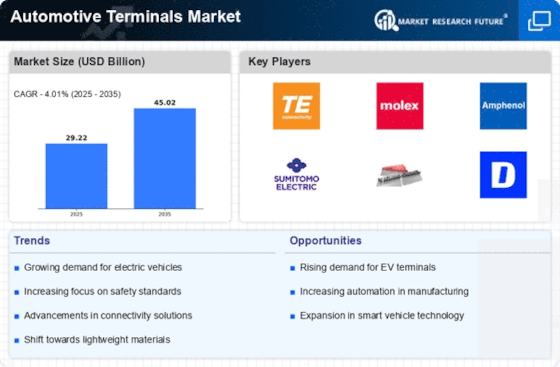Top Industry Leaders in the Automotive Terminals Market
*Disclaimer: List of key companies in no particular order
The automotive terminals market, often unseen yet vital as the lifeblood of modern vehicles, quietly propels significant growth. This realm witnesses established industry leaders and agile newcomers vying for supremacy, each striving to bridge the evolving demands of electric vehicles with conventional combustion systems. Let's unravel the essential strategies, driving forces, and emerging trends sculpting this intricate battleground.
Key Strategies of Market Players:
Product Diversification: Dominant players like TE Connectivity and Yazaki are expanding beyond conventional terminals, introducing high-voltage solutions tailored for electric and hybrid vehicles. This diversification caters to the swiftly growing EV segment, securing market share in both traditional and futuristic systems.
Technological Advancements: Manufacturers continuously innovate to enhance reliability and efficiency. For instance, Lear Corporation focuses on lightweight and miniaturized terminals, reducing vehicle weight and enhancing fuel economy. These advancements deliver a competitive advantage by tackling pivotal engineering challenges.
Vertical Integration: Major players like Sumitomo Electric delve into raw material procurement and metal processing to control costs and ensure quality. This integration fortifies the supply chain, potentially enabling competitive pricing strategies.
Global Reach and Partnerships: As production shifts geographically, companies like Furukawa Electric establish manufacturing facilities and regional partnerships to serve diverse markets. This localized approach ensures proximity to customers and minimizes logistical hurdles.
Factors Influencing Market Share Analysis:
Product Variety and Quality: Offering diverse terminals for varied applications like power systems, sensors, and lighting is critical. Players like Aptiv, with comprehensive portfolios, cater to a broader range of needs, capturing a larger market share. Consistent quality and reliability, exemplified by Hitachi Metals' stringent manufacturing standards, foster customer trust and loyalty.
Cost Competitiveness: While performance is essential, cost remains a pivotal driver. Companies like Molex lead with cost-effective terminal solutions, appealing to price-sensitive manufacturers, especially in emerging markets.
Customer Service and Support: Prompt and efficient technical support is vital for seamless production. For instance, Kyungshin offers comprehensive after-sales support and training programs, ensuring customer satisfaction and minimizing downtime.
Sustainability Focus: Environmental responsibility emerges as a key differentiator. Manufacturers like Yazaki develop eco-friendly materials and recycling processes for terminals, aligning with increasing industry sustainability regulations and attracting environmentally conscious customers.
New and Emerging Trends:
Miniaturization and Lightweighting: The demand for compact and lightweight vehicles necessitates smaller, lighter terminals. Companies like TE Connectivity develop micro-terminals and connector systems, contributing to reduced vehicle weight and improved fuel efficiency.
Smart Terminals: Integration of sensors and data analytics into terminals gains traction. These "smart" terminals monitor system performance, predict potential issues, and enable predictive maintenance, optimizing efficiency and safety.
Material Innovations: Research focuses on advanced materials like high-strength alloys and conductive polymers. These materials promise improved performance, corrosion resistance, and higher operating temperatures, making terminals more robust and adaptable.
Overall Competitive Landscape:
The automotive terminals market is a dynamic and fiercely competitive space driven by technological advancements, the ascendancy of electric vehicles, and a mounting focus on sustainability. Key players adapt their strategies to cater to these evolving needs, focusing on diversifying products, technological leadership, global reach, and responsible manufacturing. Emerging trends like miniaturization, smart terminals, and material innovations disrupt the landscape, presenting opportunities for innovative players to gain an edge. Ultimately, this market is poised for sustained growth, and those who navigate its complexities adeptly, offering reliable, efficient, and cost-effective solutions for both traditional and electric vehicles, will secure a lasting competitive advantage.
Industry Developments and Recent Updates:
TE Connectivity:
-
Date: December 15, 2023 -
Source: Press Release -
Update: Announced the launch of a new high-voltage connector series for electric vehicles (EVs) with enhanced performance and reduced weight.
Sumitomo Electric Industries:
-
Date: December 20, 2023 -
Source: Nikkei Asian Review -
Update: Partnering with a Chinese battery manufacturer to develop next-generation lithium-ion batteries for EVs.
Delphi Plc:
-
Date: December 27, 2023 -
Source: Company Website -
Update: Secured a significant order from a European automaker for its advanced driver-assistance systems (ADAS) sensors.
Furukawa Electric Co., Ltd.:
-
Date: December 19, 2023 -
Source: Press Release -
Update: Developed a new high-speed data transmission cable for in-vehicle networks.
PKC Group:
-
Date: December 14, 2023 -
Source: Company Website -
Update: Acquired a German manufacturer of automotive wiring harnesses, expanding its presence in Europe.
Top Companies in the Automotive Terminals Industry: TE Connectivity Ltd. (Switzerland), Sumitomo Electric Industries, Ltd. (Japan), Delphi Plc (U.K), Lear Corporation (U.S.), and Furukawa Electric Co., Ltd. (Japan). PKC Group (Finland), Molex, LLC (U.S.), Grote Industries (U.S.), Keats Manufacturing Co. (U.S.), Viney Corporation Limited (India), and others.










